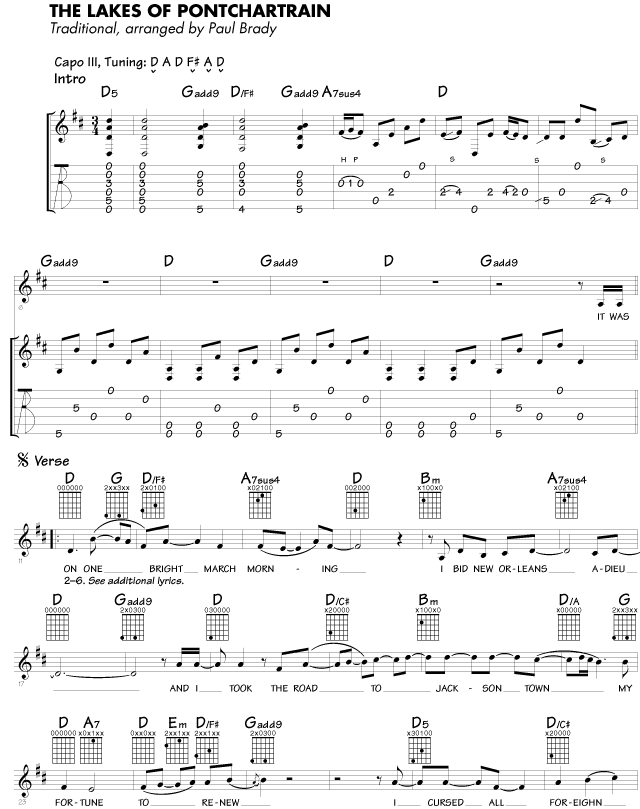O’er railroad ties and crossings
I made my weary way,
Through swamps and elevations
My tired feet did stray
Until I resolved at sunset
Some higher ground to win.
‘Twas there I met with a Creole girl
By the lake of Ponchartrain.
The Lakes of Pontchartrain is an American (US) ballad about a man who is given shelter by a beautiful Louisiana Creole woman. He falls in love with her and asks her to marry him, but she is already promised to a sailor and declines.
According to BobDylan.com Dylan played it 18 times live from 1988 to 1991.
Bob Dylan sings fantastic on the two versions I managed to dig up (Neil Young was on stage with Dylan on both these occasions).
Paul Brady has done maybe the most known version of this traditional song. Here is a video where he talks about how he learned Bob Dylan to play The Lakes of Pontchartrain:
This is a great version from Bob Dylan in New Jersey 1988, June 24 :
From Wikipedia:
The exact origin of the song is unknown, though it is commonly held to have originated in the southern United States in the 19th century. In the liner notes of Déanta’s album Ready for the Storm, which includes the song, it is described as a “traditional Creole love song.” The liner notes accompanying Planxty’s version state that the tune was probably brought back by soldiers fighting for the British or French armies in Louisiana and Canada in the War of 1812. Although the tune might date to that period, the popular lyrics undoubtedly came much later, since they tell of taking a railway train from New Orleans to Jackson Town. This was most likely to be the railway junction town of Jackson, Tennessee (named in honor of Louisiana Governor, General Andrew Jackson). The line would have been the New Orleans, Jackson and Northern Railway—whose line, opened in the 1860s, included a pre-existing local line running north from downtown New Orleans along the shores of Lake Pontchartrain.
Most likely, the lyrics date to the Civil War, and the reference to “foreign money” being “no good” could refer to either U.S. or Confederate currency, depending upon who was in control of the area at the time. It should also be noted that thousands of banks, during the civil war, issued their own bank notes, which could be rejected in various towns, depending on how trusted were the issuing bank. Also, the Confederacy and Union issued their own bank notes—as did individual States—leading to a proliferation of currency (notes and coinage) that might not be acceptable in a particular region.
I have heard the song referred to as “The Creole Girl”
“Good evening, fair maiden,
My money does me no good.
If it wan’t for the allegators
I’d stay out in the wood.”
“You’re welcome, welcome, stranger.
At home it is quite plain
For we never turn a stranger
From the lake of Ponchartrain.”
Another fine take from June 1988 (7th or 10th I think):
She took me to her mother’s home
And she treated me quite well;
Her long black hair in ringlets
Upon her shoulders fell.
I tried to paint her picture
But, alas, it was in vain
So handsome was that Creole girl
By the lake of Ponchartrain.
 I asked her if she’d marry me
I asked her if she’d marry me
She said that ne’er could be;
She said she had a lover,
And he was on the sea,
She said she had a lover
It was true she would remain,
Until he returned for the Creole girl
By the lake of Ponchartrain.
Paul Brady – The Lakes of Pontchartrain (1977):
Adieu, adieu, fair maiden,
You ne’er shall see me more
And when you are thinking of the old times
And the cottage by the shore
And when I meet a sociable
With a glass of the foaming main
I’ll drink good health to the Creole girl
By the lake of Ponchartrain.
- Hallgeir

The best version in my opinion is by the Hothouse flowers on the album “Bringing it all back home” with singer Liam O`Maonlai. It´s one of my all time favourites.
Brady’s version is better. Bobs flying at it!